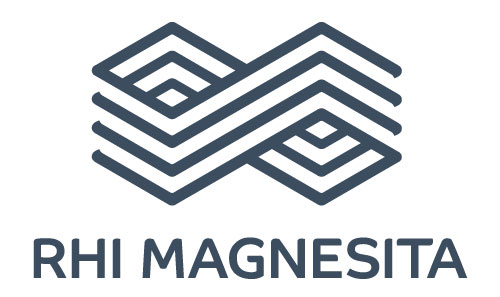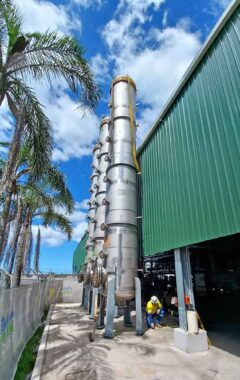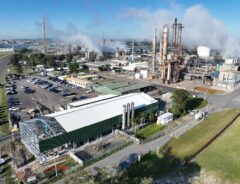The Austrian corporation RHI Magnesita is planning to build a carbon capture and utilisation (CCU) test plant in Hochfilzen in Tyrol that could be used as a global model for mineral carbonation. The plan is for a new technology developed by the Australian cleantech start-up MCi Carbon to be showcased here from 2028 within the scope of real-life operations.
RHI Magnesita is the global market leader in high-grade refractory products and systems, which are essential for high-temperature processes above 1,200 °C in the steel, cement, non-ferrous metals and glass industries. Refractory materials protect production plants (e.g. blast furnaces in the steel industry) from extreme heat and chemical attacks and play a key role in recycling metals. The company has a fully integrated added value chain, from raw materials to refractory products through to end-to-end solutions.

The company is a global market leader in refractory products and systems and employs more than 20,000 people at 67 main production sites (including raw material sites), 12 recycling plants and more than 70 sales offices.
Pioneering technology from Australia
Producing refractory materials is a very energy and emission-intensive process. This is why RHI Magnesita invests in innovative technologies and solutions aimed at reducing emissions on a continuous basis. Carbon Capture and Utilisation plays a key role in this. The company is working with the Australian start-up MCi Carbon, which has developed a key technology for mineral carbonation. The technology, which is currently being tested in Australia, converts CO2 from industrial processes into industrial minerals such as magnesite and silicate. These materials can be used in construction products such as concrete and cement, as well as in ceramics, fertilisers, paper and plasterboard. RHI Magnesita is the main investor and first global commercial customer of MCi Carbon. The pilot operations in Australia are intended to evaluate the scalability of the technology and enable its use in Austria from 2028.
Pilot plant in Tyrol
RHI Magnesita plans to roll out a commercial-scale carbon capture and utilisation (CCU) test plant from 2028 at the Hochfilzen site in Tyrol, which will extract 50,000 tonnes of CO2 per year from the flue gas stream and convert it into industrial minerals that are chemically stable. In a subsequent stage the company aims to decarbonise 90% of the entire site by the start of the 2030s. The construction of the first commercial CCU test plant in Hochfilzen requires additional investments of more than EUR 100 million.In addition to public funding, successful implementation of the project also crucially depends on the fact that the CO2 captured using MCi carbon technology is recognised as permanently chemically bound and that there is no obligation to surrender EU-ETS allowances. RHI Magnesita is fully committed to using renewable energy sources to support the project. There are also plans in place to optimise the site logistics using a new logistics centre so that raw materials and products can be transported by rail even more efficiently.
Contribution to climate neutrality and the circular economy
The raw material for the refractory products is magnesium carbonate, which is mined by RHI Magnesita. CO2 is released from the rocks during the production of the refractory material and escapes into the atmosphere. The plan is to capture the CO2 in future and convert it into a silicate mineral as well as magnesium carbonate in the MCi plant. Using the silicate product as a low-CO2 alternative aggregate, e.g. in the cement industry, can save up to 50% CO2 per tonne. RHI Magnesita plans to supply 800,000 tonnes of silicate to the cement industry over the long term (mainly regionally, within a radius of a few hundred kilometres). It also plans to process 350,000 tonnes of magnesite using the CO2 cycle process and use this as a raw material in various industries, without any additional CO2 being released. This means that RHI Magnesita will be making a crucial contribution to decarbonisation, both at the Hochfilzen site as well as in other industries.
International awards and funding
The ‘CCUpScale’ project was honoured with the Net-Zero-Industries Award as ‘National Winner Austria’ in the ‘Outstanding Projects’ category in 2024.1
Within the scope of the ‘Australia-Austria Call for Industrial Decarbonisation’ of the Mission Net-Zero-Industries, the startup MCi Carbon is being funded by the Australian side, while RHI Magnesita is being supported by the Austrian Climate and Energy Fund for the development of the CCU pilot plant in Hochfilzen. This R&D funding will enable crucial activities, such as the analysis of raw materials, pre-trial testing, scale-up process engineering and industrial integration – key milestones for advancement of the pioneering CCU plant.
www.rhimagnesita.com/rhi-magnesita-and-australian-cleantech-mci-carbon-enter-long-term-strategic-cooperation-to-decarbonise-refractories/
1 mission-innovation.net/missions/net-zero-industries-mission/net-zero-industries-award-2024


